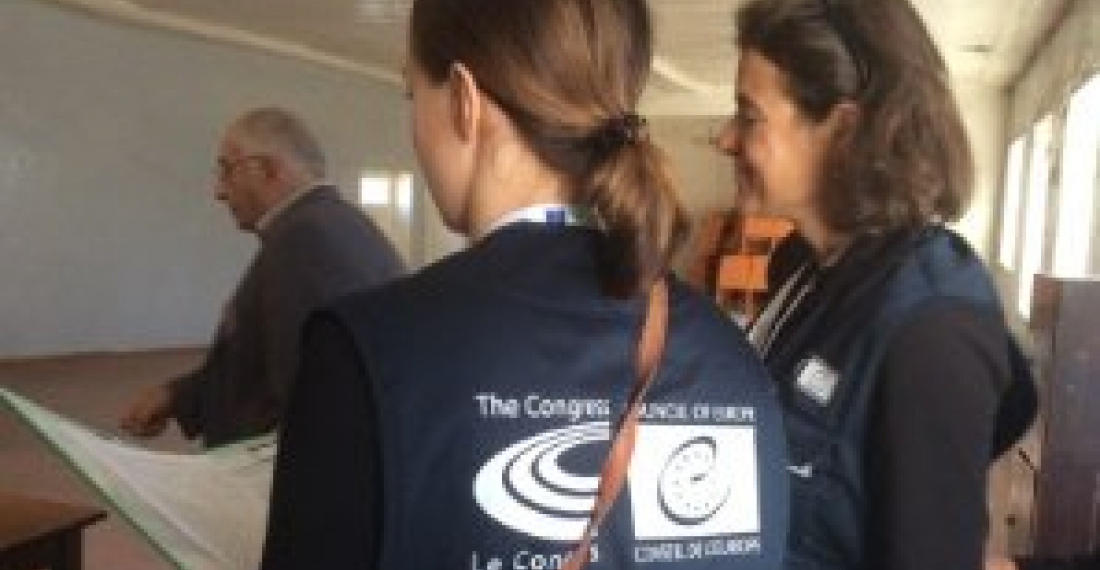The delegation from the Congress of local and regional authorities of the Council of Europe, that monitored last Sunday's partial local elections in Armenia, has issued a statement, posted on the Congress website. The Head of the delegation in its statement raised the issue of the accuracy of the electoral list, as well as what it calls the "grey zone" of assisted voting
The statement of the Mission was published on the Council of Europe website. It states:
In the frame of its targeted mission to assess the local by-elections held yesterday in a part of Armenia's communities, a 15 member delegation from the Congress of Local and Regional Authorities of the Council of Europe visited polling stations in four regions of the country. The delegation, headed by Congress' Rapporteur Liisa Ansala (Finland, ILDG) and including two members of the EU Committee of the Regions, was deployed to Aragatsotn, Armavir, Ararat and Tavush, where, in total, seven teams observed the vote in 100 polling stations.
The polling organised in more than 300 Armenian communities (out of currently some 900) was conducted for both mayoral and councillor seats. In the majority of the municipalities both elections were held, 22 communities voted only for the Mayor, 80 only for the Municipal Council. Overall, the Congress' delegation found that the elections were well organised and E-Day carried out in an orderly manner with the exception of a few incidents and instances of crowdedness in certain polling stations. Overall, more political competition between candidates was noticed in larger communities, whereas in many smaller localities often only one candidate remained in the list of mayoral candidates.
In addition to individual features of the electoral process which need to be addressed by the authorities for future elections, notably the grey zone in respect of the so-called "assisted voting" for elderly and voters with disabilities, the Congress' delegation noticed overall a high number of voters on voters' lists who reside de facto abroad, a situation bearing the risk of electoral fraud and therefore constituting a constant concern for electoral observers.
The new Electoral Code of Armenia and provisions to address, in particular, the prevention of electoral fraud due to multiple voting, has been under discussion between the Government, the opposition, civil society and the Council of Europe Venice Commission over the last months. The local by-elections held on 18 September were still governed by the existing 2011 Electoral Code and did therefore not allow the Congress' observers to assess the effectiveness of measures foreseen to increase the transparency of the electoral process, notably the access of different stakeholders to the list of voters who have actually cast their ballot.
For Congress' Head of Delegation Liisa Ansala the improvement of the quality of voters' lists in Armenia is of crucial importance for the trust of citizens in the system: "Transparency - together with more competition between candidates - is needed to increase the interest of the population in local elections which are currently mainly seen as a formality by the citizens. We will see in how far the new Electoral Code, introducing the proportional electoral system, and the decentralisation reform, which is currently being implemented, will be able to change the situation to the better."
"It is clear that local communities in Armenia need to be strengthened - financially, logistically but also in terms of public awareness for the importance of the local level of government. The organisation of all local elections on one single day in the entire country could be conducive in this respect", Ansala stated.
The detailed Information Report following the Electoral Assessment Mission will be debated in the frame of the 31st Congress Session on 19-21 October in Strasbourg.
A statement published on the website of the Congress added:
Armenia ratified the European Charter of Local Self Government in 2002. The countries which have ratified the Charter are bound by its provisions. The Charter requires compliance with a minimum number of rights, which form the European bedrock of local self-government. The Congress of Local and Regional Authorities makes sure that these principles are observed.
source: Council of Europe, Congress of Local and regional authorities







